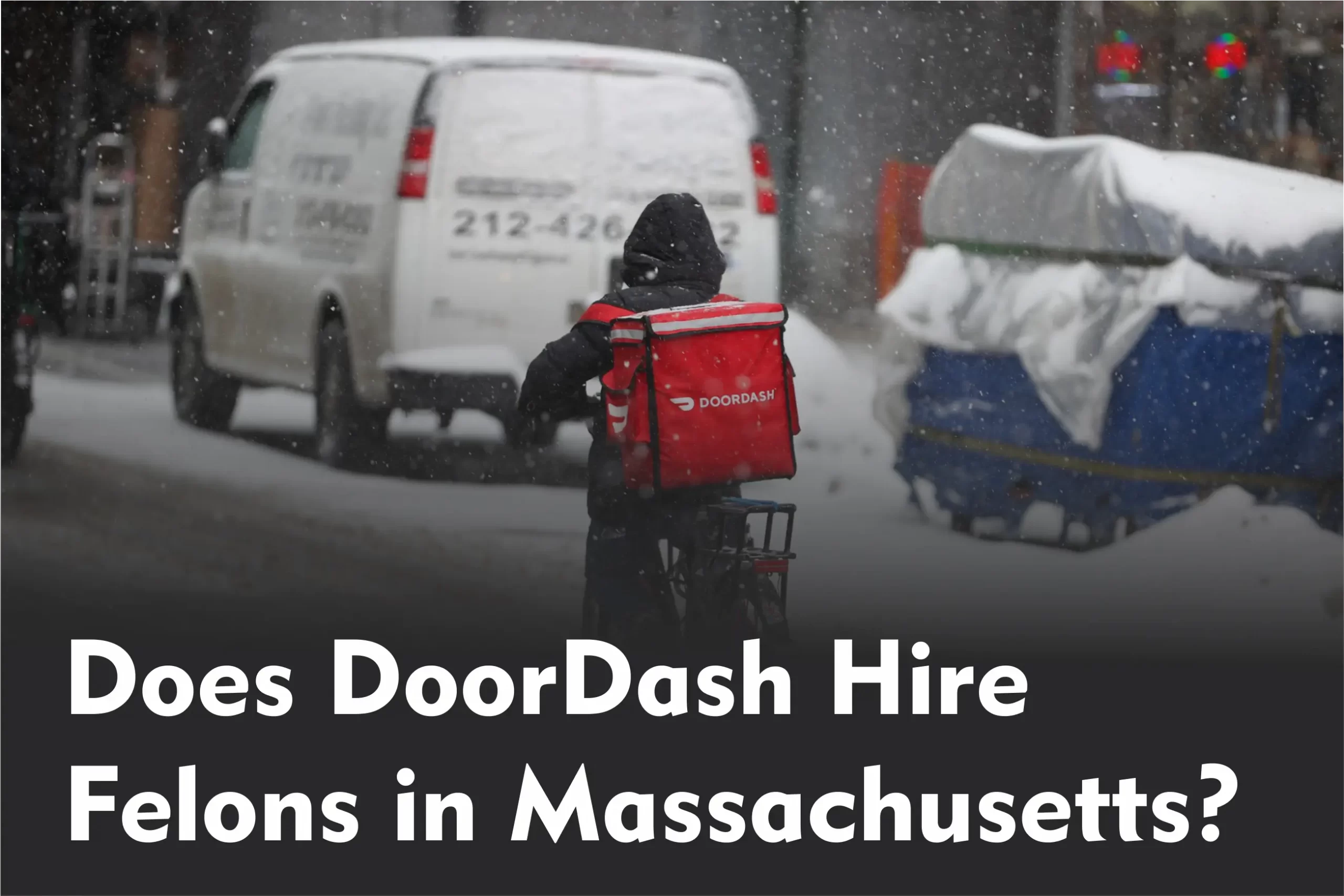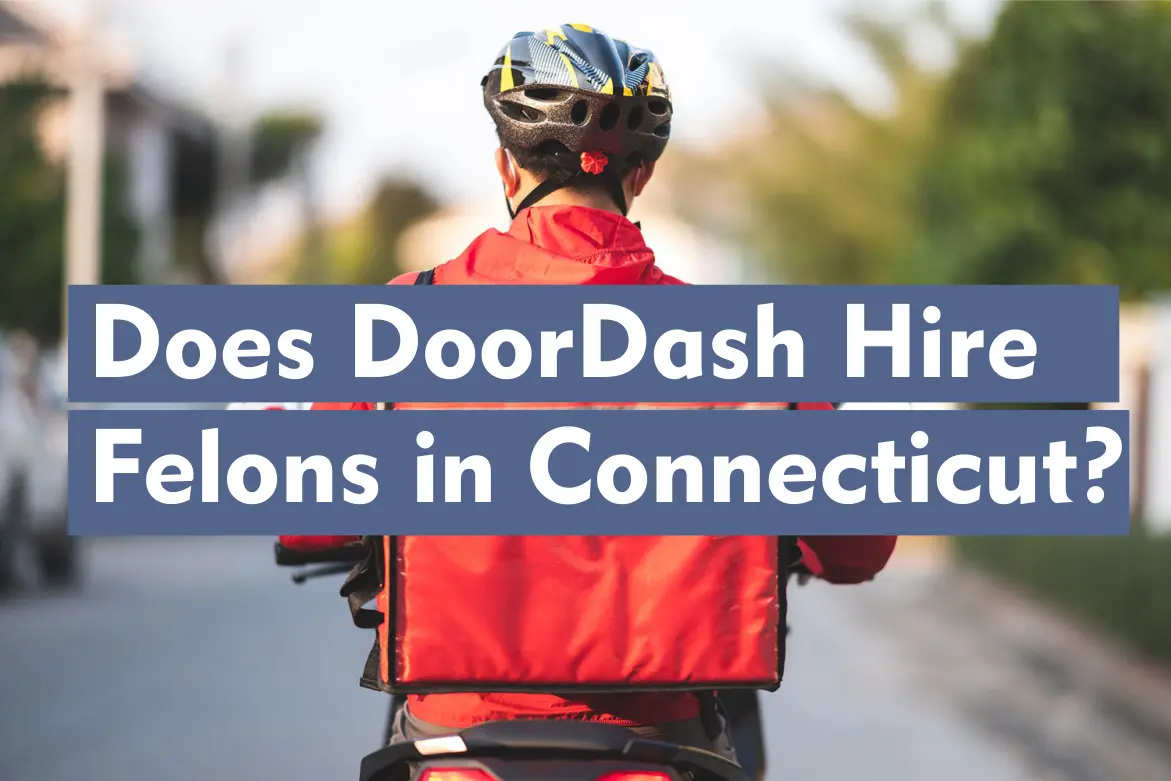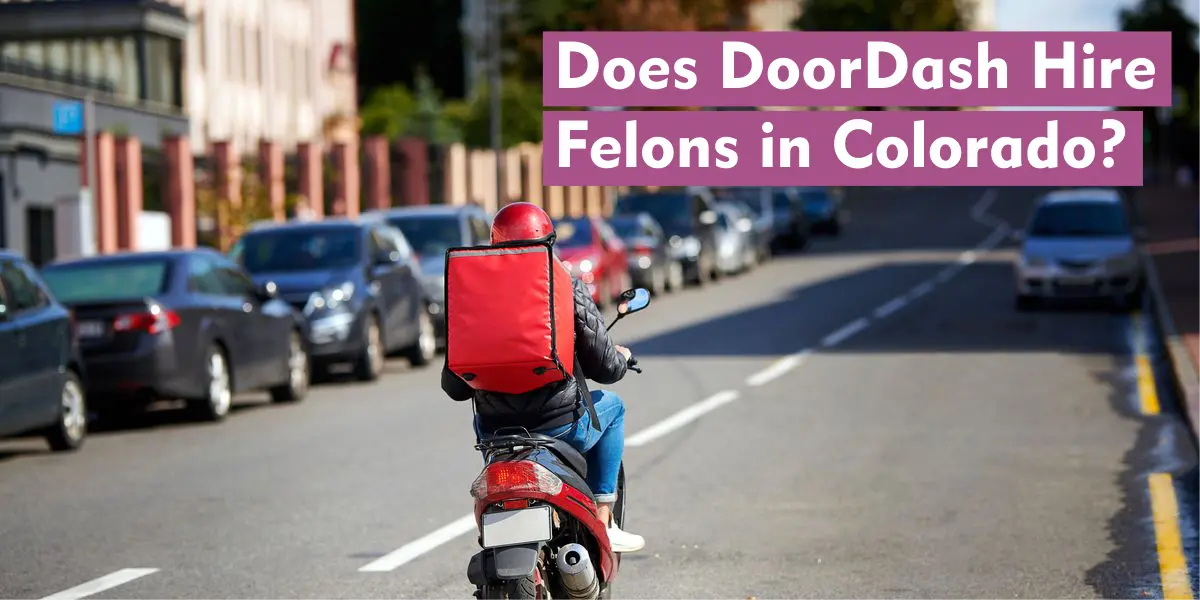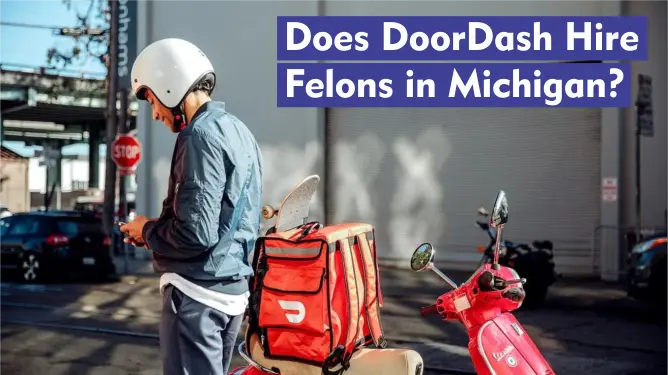The gig economy has become increasingly popular in recent years, providing flexible work arrangements for many people. DoorDash is one such platform that offers food delivery services to customers. While it has helped create job opportunities for many, one question that arises is whether DoorDash hires felons in Arizona.
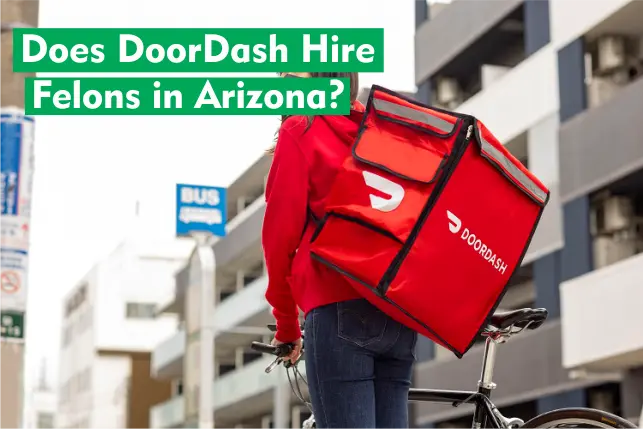
For individuals who have a criminal record, finding employment can be challenging. Having a felony conviction on one’s record can limit job opportunities, making it difficult to secure stable employment. However, studies show that employment opportunities for felons can reduce recidivism rates, improving their chances of leading productive lives.
The purpose of this article is to explore whether DoorDash hires felons in Arizona, and to examine the importance of providing employment opportunities for those with criminal records.
Overview of Felony Convictions
A felony conviction is a serious criminal offense that is typically punishable by imprisonment for more than one year. In the United States, the classification of a crime as a felony varies by state and can be based on the severity of the offense or the value of the property stolen.
There are various types of felony convictions, including violent crimes like murder, assault, and robbery, as well as non-violent crimes such as drug trafficking, white-collar crimes like fraud or embezzlement, and sex crimes. A person who is convicted of a felony may face a range of penalties, including incarceration, fines, probation, and community service.
Having a felony conviction on one’s record can significantly affect employment opportunities. Many employers conduct background checks as part of their hiring process, and a felony conviction can make it difficult for an individual to secure a job. Felony convictions may also result in the loss of professional licenses or the ability to work in certain fields.
Additionally, some states have laws that prohibit employers from hiring individuals with certain types of felony convictions, such as those related to child abuse or sexual assault. These restrictions may make it difficult for individuals with felony convictions to find employment, even if they have completed their sentences and are looking to rebuild their lives.
DoorDash’s Hiring Policies
DoorDash’s hiring process includes a background check to ensure that all of its drivers meet the company’s standards for safety and reliability. The background check typically covers the last seven years of an applicant’s criminal history, including both felony and misdemeanor convictions.
According to DoorDash’s website, the company may consider applicants with criminal convictions on a case-by-case basis. However, DoorDash does have policies in place that may disqualify applicants with certain types of felony convictions. These policies vary by state and may be influenced by local laws and regulations.
In general, DoorDash may not hire applicants who have been convicted of violent crimes, sexual offenses, or crimes involving theft or property damage. Additionally, applicants with DUI or reckless driving convictions may not be eligible to work for DoorDash.
Despite these policies, DoorDash may consider exceptions for individuals with felony convictions that are older or less serious in nature. In some cases, DoorDash may also consider an applicant’s efforts to rehabilitate and lead a law-abiding life since their conviction.
Overall, DoorDash’s hiring policies regarding felons are not set in stone and may be subject to change based on local laws and regulations. Applicants with felony convictions may have a better chance of being hired if they can demonstrate their rehabilitation and commitment to being a safe and reliable driver for DoorDash.
Legal Considerations
Employment law in the United States provides some protections for individuals with felony convictions seeking employment. The Equal Employment Opportunity Commission (EEOC) has issued guidelines that prohibit employers from using blanket policies that automatically exclude individuals with criminal records from employment. Instead, employers must consider the nature and severity of the offense, how long ago it occurred, and whether it is relevant to the job in question.
Under the EEOC guidelines, employers must also give applicants with criminal records the opportunity to explain the circumstances of their convictions and demonstrate their rehabilitation and qualifications for the job.
The Fair Credit Reporting Act (FCRA) also has an impact on background checks used in the hiring process. The FCRA requires employers to obtain written consent from applicants before conducting a background check, and to provide applicants with a copy of the report if the employer decides not to hire them based on its contents.
The FCRA also requires employers to take certain steps before taking adverse action against an applicant based on their criminal record. These steps include notifying the applicant of the potential adverse action, providing them with a copy of the background report, and giving them an opportunity to dispute any inaccuracies in the report.
In summary, while employers have some discretion in hiring individuals with felony convictions, they must still comply with EEOC guidelines and FCRA requirements when using background checks in the hiring process. Employers must give applicants with criminal records a fair chance to demonstrate their qualifications and rehabilitation, and take steps to ensure the accuracy and relevance of the information obtained through background checks.
Factors Affecting Hiring Decisions
When making hiring decisions, DoorDash may consider a variety of factors beyond an applicant’s criminal record. These factors may include driving record, insurance coverage, and overall suitability for the job.
DoorDash also employs risk management strategies to ensure the safety and reliability of its drivers. These strategies may include ongoing monitoring of driver performance, the use of technology to track driving behavior, and partnerships with insurance providers to mitigate risk.
In addition to its own risk management strategies, DoorDash must also comply with local laws and regulations that govern the hiring of individuals with criminal records. These laws may vary by state and may impact DoorDash’s ability to hire individuals with certain types of felony convictions.
For example, some states have laws that restrict employers from hiring individuals with certain types of felony convictions, such as those related to child abuse or sexual assault. Other states may have “ban the box” laws that prohibit employers from asking about an applicant’s criminal history on the initial job application.
Overall, DoorDash’s hiring decisions are likely influenced by a variety of factors, including local laws and regulations, risk management strategies, and the overall suitability of the applicant for the job. Applicants with felony convictions may have a better chance of being hired if they can demonstrate their qualifications and rehabilitation, and if their convictions are not deemed to pose a significant risk to the safety and reliability of DoorDash’s services.
The Benefits of Hiring Felons
There are several potential benefits for employers who hire individuals with felony convictions. One of the primary benefits is that it can help companies tap into a pool of qualified and motivated workers who may otherwise be overlooked. Many individuals with felony convictions have completed job training or education programs while incarcerated, and are eager to rebuild their lives and contribute to their communities.
Hiring felons can also positively impact the community by reducing recidivism rates and promoting public safety. Studies have shown that individuals who are able to find steady employment after release from prison are less likely to reoffend, which can benefit both the individuals and the communities they live in.
In addition to these potential benefits, there are also programs and incentives available to employers who hire individuals with felony convictions. The Federal Bonding Program, for example, provides insurance coverage to employers who hire individuals with criminal records, which can help reduce the perceived risk of hiring these individuals. Other programs, such as the Work Opportunity Tax Credit (WOTC), provide tax incentives to employers who hire individuals from certain targeted groups, including ex-offenders.
Overall, hiring individuals with felony convictions can be a win-win for both employers and their communities. By providing opportunities for these individuals to rebuild their lives and contribute to society, employers can help promote public safety and reduce recidivism rates, while also gaining access to a pool of motivated and qualified workers.
The Challenges of Hiring Felons
While there are potential benefits to hiring individuals with felony convictions, there are also challenges and risks that employers must consider. One of the primary concerns is the perceived risk of hiring someone with a criminal record, particularly if the nature of the offense is deemed to pose a risk to public safety or the reputation of the company.
Another challenge is the potential impact on workplace morale and productivity. Some employees may feel uncomfortable working alongside someone with a criminal record, which could lead to tension and reduced productivity. Additionally, individuals with felony convictions may face personal challenges that could impact their ability to perform their job, such as difficulty finding transportation or housing.
To mitigate these risks and concerns, employers can implement several strategies. One approach is to establish clear guidelines for hiring individuals with felony convictions, including the types of offenses that are deemed unacceptable and the steps that will be taken to ensure the safety and security of the workplace.
Employers can also provide support and resources to help individuals with felony convictions succeed in their jobs. This may include access to job training programs, transportation assistance, and support networks to help individuals address any personal challenges they may face.
Another strategy is to implement ongoing monitoring and support for individuals with felony convictions, including regular performance evaluations and feedback, as well as access to counseling and other support services as needed.
Overall, while there are potential risks and challenges associated with hiring individuals with felony convictions, with the right approach and support, employers can help these individuals rebuild their lives and contribute to their communities while also benefiting from their skills and talents.
Resources for Felons Seeking Employment
There are a variety of resources available for individuals with felony convictions who are seeking employment. These resources may be offered by local, state, or national organizations, and may include job training programs, job placement services, and support networks to help individuals address personal challenges that may impact their ability to find and maintain employment.
One resource available to felons seeking employment is the Federal Bonding Program, which provides insurance coverage to employers who hire individuals with criminal records. This program can help reduce the perceived risk of hiring individuals with felony convictions and may make employers more willing to take a chance on these individuals.
Another resource is the Work Opportunity Tax Credit (WOTC), which provides tax incentives to employers who hire individuals from certain targeted groups, including ex-offenders. This program can help reduce the financial burden of hiring individuals with felony convictions and may make it more attractive for employers to consider these individuals for job openings.
There are also a variety of local and national organizations that provide job training and placement services specifically for individuals with felony convictions. These programs may include job readiness training, resume and interview preparation, and ongoing support and mentoring to help individuals succeed in their jobs.
Some examples of national organizations that provide these types of services include the Center for Employment Opportunities, which offers job training and placement services to individuals with criminal records in several states across the country, and the Safer Foundation, which provides employment services, education, and support to individuals with criminal records in several cities across the United States.
Additionally, many local organizations and community groups may offer similar services and support to individuals with felony convictions. These resources may be particularly helpful for individuals who are looking for employment opportunities in their local communities and may have unique insights and connections to local employers.
Success Stories of Felons Employed by DoorDash
While there may be challenges and risks associated with hiring felons, there are also many success stories of individuals with criminal records who have been able to rebuild their lives and find meaningful employment. DoorDash is one company that has provided opportunities for individuals with felony convictions to succeed in the gig economy.
One success story is that of a DoorDash driver named John, who was able to turn his life around after serving time in prison for drug-related offenses. John was able to use his experience and skills to build a successful career as a DoorDash driver, providing a valuable service to his community and supporting his family in the process.
Another success story is that of a DoorDash driver named Jane, who struggled to find employment after being released from prison due to a drug-related offense. Through DoorDash, Jane was able to build a successful career as a driver, earning a steady income and developing valuable skills that have helped her rebuild her life and support her family.
These success stories demonstrate the potential for felons to succeed in the gig economy, and the importance of providing employment opportunities and support to individuals with criminal records. By providing a pathway to meaningful employment, companies like DoorDash can help individuals with felony convictions rebuild their lives and contribute to their communities, while also benefiting from their skills and talents.
Moreover, these success stories show that with the right support, felons can overcome the challenges and barriers they may face in the job market and find success in the gig economy. By creating a supportive and inclusive workplace environment, companies like DoorDash can help individuals with criminal records succeed and thrive, while also benefiting their business and the broader community.
Conclusion
In conclusion, DoorDash has policies in place that allow for the hiring of individuals with felony convictions, subject to certain conditions and requirements. While there are potential risks and challenges associated with hiring felons, there are also many benefits to be gained from providing opportunities for these individuals to rebuild their lives and contribute to their communities.
By creating a supportive and inclusive workplace environment, companies like DoorDash can help felons succeed and thrive in the gig economy, while also benefiting their business and the broader community. Moreover, by providing resources and support to felons seeking employment, companies can help break down barriers and create a more equitable and just society.
As such, we encourage employers to consider the potential benefits of hiring felons and to take steps to create a more inclusive and supportive workplace environment. By doing so, we can help build a more just and equitable society, while also benefiting our businesses and communities.
FAQs
Can DoorDash legally hire felons?
Yes, DoorDash can legally hire felons, subject to certain conditions and requirements.
Will DoorDash conduct a background check on felons?
Yes, DoorDash conducts background checks on all potential employees, including felons.
What types of felony convictions would disqualify someone from being hired by DoorDash?
DoorDash’s policies vary by state and depend on the nature and severity of the offense, as well as the time elapsed since the conviction. Generally, violent offenses and certain drug-related offenses may disqualify someone from being hired by DoorDash.
Are there any exceptions to DoorDash’s policies towards hiring felons?
DoorDash may make exceptions for individuals with felony convictions if they can demonstrate rehabilitation and a commitment to their community.
How can felons increase their chances of being hired by DoorDash?
Felons can increase their chances of being hired by DoorDash by demonstrating a strong work ethic, a commitment to their community, and a willingness to take responsibility for their past actions.
What resources are available for felons seeking employment with DoorDash?
Felons can access resources such as job training programs, legal services, and support groups that are designed to help them find employment and rebuild their lives.
What benefits does DoorDash offer to its employees?
DoorDash offers benefits such as health insurance, 401(k) plans, and paid time off to its employees.
Can felons work as independent contractors for DoorDash?
Yes, felons can work as independent contractors for DoorDash, subject to the company’s policies and requirements.
How long does it take for DoorDash to complete a background check?
The background check process can take anywhere from a few days to a few weeks, depending on the complexity of the individual’s criminal history.
What should felons do if they are denied employment by DoorDash due to their criminal record?
Felons who are denied employment by DoorDash due to their criminal record may be able to appeal the decision or seek legal assistance to explore their options. They can also seek out other employment opportunities and resources to help them rebuild their lives.
